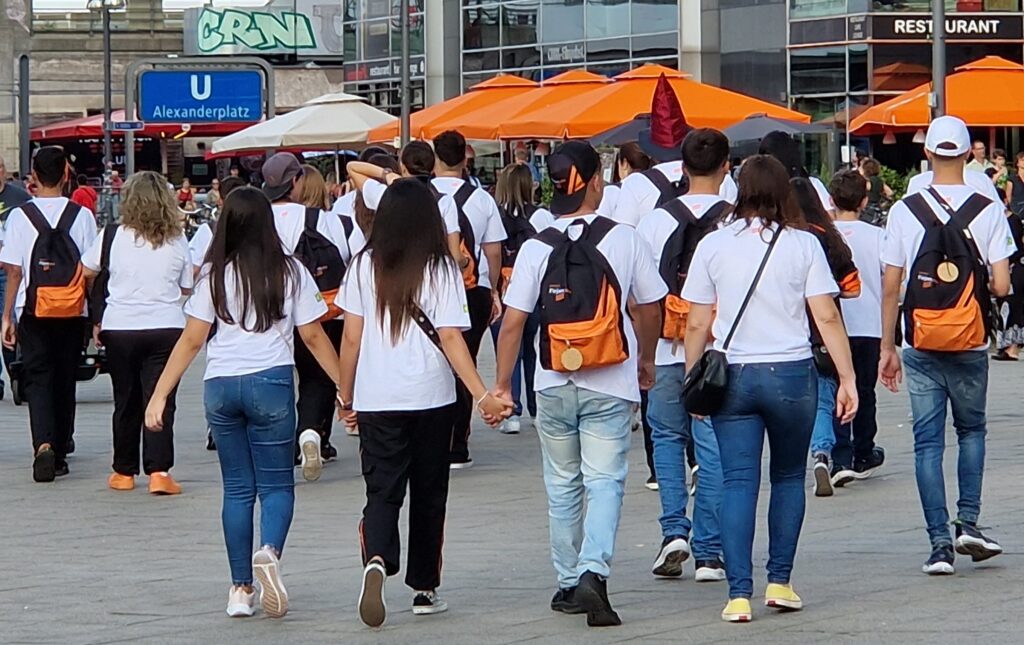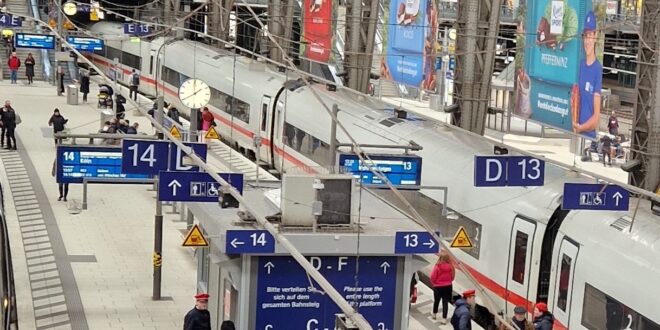Regulations and laws are constantly changing in Germany. June 2024, too, brings new ones that affect various areas of everyday life. For example, the plastic BahnCard will be a thing of the past, 16-17 year-olds will be allowed to vote in the European elections for the first time and foreigners will be able to naturalise more easily. Also, the new ‘opportunity card’ will make it easier for foreign skilled workers to come to Germany and refugees will no longer receive benefits in cash. An overview of these and other changes taking effect in this month.

Naturalisation made easier
The ‘Act on the Modernisation of Citizenship Law’ will enter into force on 27 June. The reform of Germany’s naturalisation law, which was passed by the Bundestag in January and approved by the Bundesrat in February, was signed into law by the President on 26 March.
The changes in the citizenship law offer several improvements.
Henceforth, children who were born in Germany and whose parents have lived in the country for a long time would be automatically granted German citizenship.
Naturalisations are to be faster now. Foreigners will be able to apply for a German passport after just five years of residence instead of eight. In the case of special integration achievements such as good language skills and participation in voluntary work, naturalisation can take place after just three years.
Until now, only people from the EU, Switzerland or countries that prohibit the renunciation of citizenship have been able to obtain dual citizenship. In future, multiple nationality will be possible in principle.
However, the new law precludes persons found to hold anti-Semitic or racist views from naturalisation. This also applies to polygamists and those who exhibit disregard for equal rights for men and women.
The basic requirement for German citizenship is a commitment to the fundamental values of freedom and democracy and recognition of German history. According to lawyers, you must be against discrimination.
Also, naturalised citizens can lose their citizenship if found to have committed certain offences. This retroactive revocation is even possible up to ten years after naturalisation.
Around 14 per cent of the population in Germany do not have a German passport. That is around twelve million people. Of these, around 5.3 million have been living in Germany for at least ten years. Currently, only some of those who would be entitled to do so are naturalised. Last year, 200,100 people were granted German citizenship. That is just 3.1 per cent of foreign nationals who have lived here for at least ten years.
At 1.1 per cent, the naturalisation rate in Germany is below the naturalisation rate in the EU, which is 2.0 per cent. This will change with the ‘Act on the Modernisation of Citizenship Law’, analysts say.
_________________
Finding a job with the opportunity card
The immigration of skilled workers from non-EU countries becomes easier with the introduction of the Chancenkarte (opportunity card).
The opportunity card is based on a points system and takes into account qualifications, professional experience, links to Germany and personal criteria such as age. Applicants can receive further points for additional achievements. Anyone who receives a total of six points will receive an opportunity card and may enter and stay in Germany for one year to look for work – provided they are able to support themselves.
READ ALSO Germany’s amended Skilled Immigration Law explained
There is a shortage of well-trained specialists in many sectors. The number of vacancies in 2022 was around 1.98 million. The government hopes the new law will attract a far greater number of skilled workers to the country.

_________________
Minors to vote at European elections
In Germany, the EU parliamentary elections will hold on 9 June. For the first time, young people aged 16-17 years can also vote in the polls. This significantly increases the number of people eligible to vote: while around 61.5 million people were eligible to vote in the last election in 2019, this figure has now risen to around 65 million.
According to the microcensus for 2023, a total of around 1.3 million 16- and 17-year-olds were living in Germany at the end of 2023. More than 45 per cent of them have a migrant background. This shows that those with a migration background are significantly higher among underage voters.
_________________
Payment card instead of cash for refugees
Refugees will no longer receive social benefits in cash, but via a so-called payment card. The amount of money to which they are entitled will be credited to it.
Recipients have to pay with this card instead of cash when they go shopping. A corresponding amendment to the Asylum Seekers’ Benefits Act came into force on 16 May 2024.
The government introduced the payment cards because some refugees are said to send the money they receive to their home countries. This, some politicians, say encourages irregular migration to Germany.
Refugees seeking protection in Germany who are unable to support themselves are entitled to benefits in accordance with the Asylum Seekers Benefits Act. This can take the form of benefits in kind, cash or vouchers.
_________________
Exceptions to noise protection rules during the European Football Championships
There is great anticipation for the 2024 European Football Championship (commonly referred to as UEFA Euro 2024), taking place from 14 June to 14 July 2024, in Germany.
Public viewing will be possible again, even at late kick-off times. The German government has passed an ordinance that allows exceptions to the current noise protection rules during the games. The ordinance will apply from 1 June to 31 July 2024.
_________________
Bahncard no longer in plastic form
From 9 June, the Bahncard 25 and Bahncard 50 will no longer be available in their current plastic form, but exclusively in digital form. Customers must register in the DB Navigator smartphone app or at bahn.de to be able to use the Bahncard.
The digital Bahncard will therefore become the standard. If you don’t have a smartphone or don’t always have it with you, you can also print out the discount card as a PDF document. Existing plastic cards can continue to be used until the end of their validity period.
For rail travellers, this means that smartphones should always be charged. If you are unable to show the ticket and your BahnCard, you may face a so-called fare surcharge of at least 60 euros or double the fare. This can be avoided by presenting the ticket or valid BahnCard within 14 days at the DB Travel Centre or via the online portal. However, this is not completely free of charge; a processing fee of seven euros still have to be paid by the customer.
Moreover, the railway is switching from the winter to the summer timetable on 9 June. This will be valid until mid-December 2024.
_________________
Tenants choose Cable television or not
Tenants in Germany have until 30 June to decide how they want to continue watching television in their apartments. Currently, the fees for the cable TV connection are included in the service charge bill (Nebenkosten or ancillary costs), as the landlord was allowed to allocate them accordingly. However, this will come to an end at the turn of the month.
Under the existing regulation, tenants often pay for the cable connection even if they do not use it. In future, they will be free to choose how they want to receive TV programmes: Cable, satellite, DVB-T2, Internet TV – or not at all.
From 1 July, landlords will no longer be allowed to pass on the costs of Cable TV reception to tenants via the service charge bill. This will also put an end to the long-standing practice of automatically obtaining a cable connection via the landlord.
Tenants are now free to choose whether they want to stay with cable TV, look for an alternative or do without TV altogether. The advantage of cable TV is its weather-independent reception, but it is expensive compared to other reception channels.
Cheaper options include online services such as Magenta TV, Zattoo or Waipu. Satellite TV is free, but only works with a satellite dish. With aerial television, you pay extra for private channels.
_________________
Paypal gets competition
From the end of June, customers of some European banks will be able to send direct payments to other users by mobile phone. This service is part of the new ‘wero’ payment system, which is being introduced by the European Payments Initiative (EPI) banking initiative.
In Germany, savings banks, cooperative banks and Deutsche Bank are taking part in the payment system.
The aim of the initiative is to create a standardised Europe-wide system for payment by card and smartphone. The aim is to provide consumers with an alternative to dominant US providers such as PayPal.
Learn more about ‘wero’ at the website of the European Payment Initiative HERE
_________________
Five federal states start the summer holidays
Children and young people have something to look forward to: The summer holidays start in five federal states in June: In Lower Saxony and Bremen on 24 June, ending on 2 August. In Saxony, the summer holidays start on 20 June and last until 2 August. The summer holidays in Saxony-Anhalt start on 24 June and end on 3 August and in Thuringia, from 20 June to 31 July.
 THE AFRICAN COURIER. Reporting Africa and its Diaspora! The African Courier is an international magazine published in Germany to report on Africa and the Diaspora African experience. The first issue of the bimonthly magazine appeared on the newsstands on 15 February 1998. The African Courier is a communication forum for European-African political, economic and cultural exchanges, and a voice for Africa in Europe.
THE AFRICAN COURIER. Reporting Africa and its Diaspora! The African Courier is an international magazine published in Germany to report on Africa and the Diaspora African experience. The first issue of the bimonthly magazine appeared on the newsstands on 15 February 1998. The African Courier is a communication forum for European-African political, economic and cultural exchanges, and a voice for Africa in Europe.



































